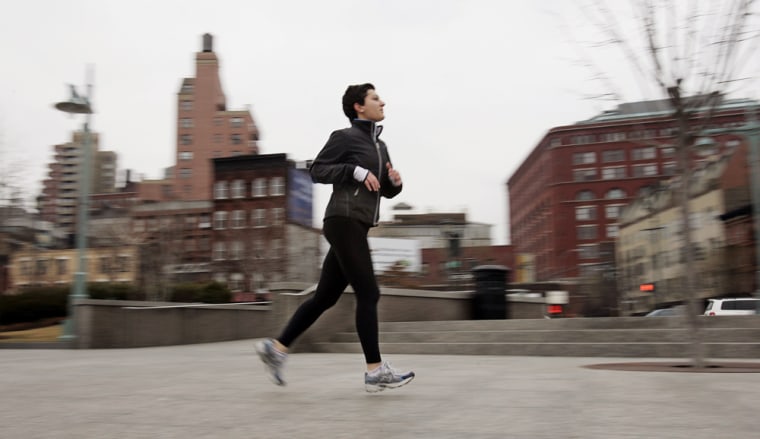With the 2005 New York Marathon coming up on Nov. 6, you might be inspired to dust off your sneakers and take a nice jog in the park. Some people will develop such a case of runners-envy that they'll even start training for a marathon. But do they have what it takes?
"In the few days and weeks after a major marathon, what we see happening all the time is people rolling off the coach and pounding out the miles," says Sam Grotewold, professional athlete manager at New York Road Runners. "That's when injuries and burnout happens."
It's not that you have to be a special type of athlete in order train for a marathon — but you most certainly have to be prepared. "A marathon is a huge commitment and investment, not only physically, but also emotionally and mentally," says Grotewold. "It's as hard emotionally to get up at six in the morning and run as it is physically, believe me."
It looks as if more and more people are making that investment: From 2003 to 2004, the number of finishers at the ING New York City Marathon — the world's largest — has increased by just under 15 percent to 36,562 people last year.
So what does it take to get started? Most experts agree that pretty much regardless of age if you already exercise for about 30 minutes per day, 3 days a week, and you've been doing that consistently and enjoying it, and are taking care of yourself and not smoking, you're in a fairly good place to jump off and begin marathon training.
Jenny Hadfield, a professional coach, co-founder of Chicago Endurance Sports — a company that trains first-timers and seasoned runners — and co-author of Marathoning for Mortals, says that tenaciousness is a key personality characteristic. "Many of the people I train might not start being tenacious, but they end up that way by the end," she says. "We're talking about goal setters here."
Aspiring marathoners' efforts pay off, even if they never do get around to crossing a finish line. Countless studies have cited the positive effect of exercise on our health. It has been shown to reduce blood pressure, aid in weight loss, help clinical depression and improve overall cardiovascular health. Exercise can simply make life better: A fall 2004 study in Behavioral Medicine even found that "high-frequency exercisers reported significantly higher health, helping, and community-related quality of life measures than those who exercised less frequently."
"You need to be cleared to run by your physician, and if you're over 40, you need to get a stress test," says Dr. Lewis Maharam, medical director of the ING New York City Marathon. With a green light from a stress test — a test that helps doctors tell if blood supply to the arteries is compromised — people are generally good to go, according to Dr. Maharam. "I've seen people with heart and lung transplants, with end stage cancer, with every imaginable disease process, cross the finish line," he says. "People of all shapes and sizes are capable of running marathons."
As for arthritis, "motion is lotion," according to Dr. Maharam. Other experts agree: A study in last month's Current Opinion in Rheumatology found that patients with rheumatoid arthritis benefit from long-term moderate or high-intensity exercises. "Moderate or high-intensity exercises were found to improve aerobic capacity, muscle strength, functional ability, and psychological well-being, and slow the age-related and sex-related decrease in bone mineral density of the hip," the study reads.
Does that sound like something you could do? Remember, no one has to run a marathon but it is a great goal for many people to get back into an exercise routine; not to mention an experience to cross off on life's checklist of personal accomplishments. But it is just as good to run a 10K — or even a few miles on a regular basis. As they say, the hardest part is taking the first step.
